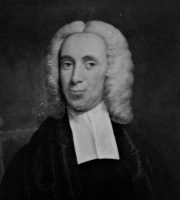About Isaac Watts
Isaac Watts (Southampton, July 17, 1674 – Abney Park, Stoke Newington, November 25, 1748) was an English poet, hymnographer, preacher, theologian, logician and pedagogue. He was an extremely prolific poet who entirely renewed English hymnology in the 18th century, including in the established Church of England. Some of his texts have survived the centuries and appear in modern collections. Although he was a popular hymn writer, he could not enter the University of Oxford or Cambridge as he was not an Anglican but of a Congregationalist religion, therefore he studied in the Stoke Newington Academy. Watts received also an excellent education at John Pinhorne Grammar School. From the age of 20 he wrote hymns for a congregation in Southampton. In 1698 he became a minister and some years later in 1702 he became pastor of a Congregational church in Mark Lane, but was forced to resign in 1712 for health reasons. In 1728 he received his doctorate from Edinburgh University.Watts was an important figure in nonconformist Calvinism in the 18th century. Indeed, as advanced by Donald Davie, the Hymns and Psalms of Isaac Watts were not only the best-known poems of the 17th century, but also the most influential English works, surpassing Johnson's Dictionary, Robinson Crusoe, Gulliver's Travels, Thomson's The Seasons or Macpherson's Ossian. His poetry is still alive today. Among the works of Watts which are sung regularly in the churches of England and the United-States O God Our Help in Ages past, When I survey the Wond'rous Cross, and the Christmas Carol Joy to the World. Isaac Watts (1674-1748), published a number of widely distributed and used collections, including Horace Lyricae (1706; completed and revised in 1709), Hymns and Spiritual Songs (1707), his most popular collection of hymns Divine Songs attempted in easy Language for the Use of Children (1715), and his Psalms of David imitated in the Language of the New Testament (1719) (a metrical version of the Psalms). These collections were regularly revised and augmented and served as a source for hymn publishers in later periods. It is estimated, for example, that by the end of the 19th century some 700 editions of the Divine Songs have been published. Among his most famous other works are A Catechism of Scripture History and of the Condition of the Jews (1863) Psalms of David (1719) and Logick, or The Right Use of Reason in the Enquiry After Truth With a Variety of Rules to Guard Against Error in the Affairs of Religion and Human Life, as well as in the Sciences. This was first published in 1724, and it was printed in twenty editions. This works of morality and piety, among others more than 750 hymns for worship, sung in many Christian churches, earned him his nickname of Father of English hymnody. Watts' book The Improvement of the Mind (1741) was intended for readers who wished to independently expand their knowledge and intellectual faculties. In his remarks, the author attached importance not only to imparting knowledge passively, but also to actively dealing with it. Among other things, Watts recommended taking notes on articles, taking notes on lectures and seeking to exchange ideas with like-minded people.
Isaac Watts died on November 25th, 1748, aged 74, in Stoke Newington, Hackney and is buried at Bunhill Fields cemetery in London.
Browse all poems and texts published on Isaac Watts









